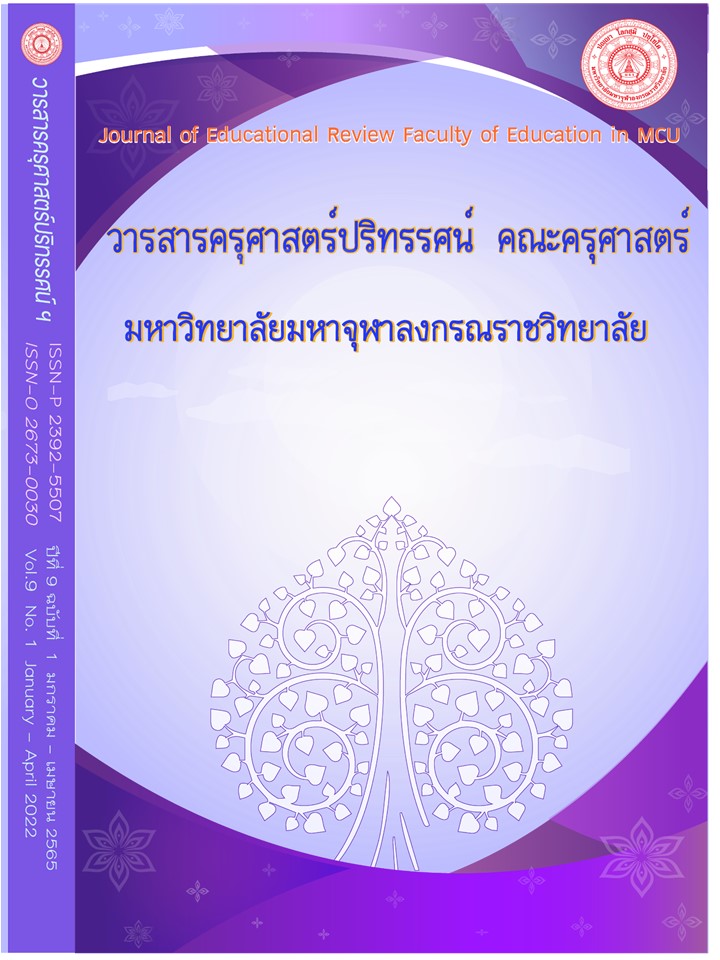ONLINE CONTEMPLATIVE EDUCATION ACTIVITIES TO ENHANCE THE MORAL VIRTUE, BEING A TEACHER OF THE 1ST YEAR STUDENTS OF THE FACULTY OF EDUCATION, SUAN SUNANDHA RAJABHAT UNIVERSITY
Main Article Content
Abstract
The objective of this research paper is to The create and experiment using contemplative education activities to strengthen the moral virtue, being a teacher of the first year students of the Faculty of Education, Suan Sunandha Rajabhat University and to compare the results of the experiment using activities to enhance the moral virtue, being a teacher of the first year students of the Faculty of Education, Suan Sunandha Rajabhat University With research methodology which is experimental development. The sample consisted of 30 first year students of the Faculty of Education, Suan Sunandha Rajabhat University. By specifying specific selection criteria for selection in the academic year 2019. The research instruments were 1) Manual of Contemplative Education Activity 2) Moral virtue assessment form teacher. Use research patterns One–Group Pretest- Posttest Design And analyze the data by using percentage, mean, standard deviation The statistics used to test the hypothesis are t - test for dependent group and One-Sample t-test The results of the research showed that First year students have moral virtue as a teacher. after the experiment higher than the experiment. Statistical significance at the level of .05
Article Details

This work is licensed under a Creative Commons Attribution-NonCommercial-NoDerivatives 4.0 International License.
ทัศนะและความคิดเห็นที่ปรากฏในบทความในวารสารฉบับนี้ถือเป็นความรับผิดชอบของผู้เขียนบทความนั้นเพียงผู้เดียว และไม่ถือเป็นทัศนะและความรับผิดชอบของกองบรรณาธิการ
กองบรรณาธิการขอสงวนสิทธิ์ในการคัดเลือกบทความลงตีพิมพ์และจะแจ้งให้เจ้าของบทความทราบหลังจากผู้ประเมินบทความตรวจอ่านบทความแล้ว
ต้นฉบับที่ได้รับการตีพิมพ์ในวารสารครุศาสตร์ปริทรรศน์ คณะครุศาสตร์ มหาวิทยาลัยมหาจุฬาลงกรณราชวิทยาลัย ถือเป็นกรรมสิทธิ์ของคณะครุศาสตร์ มหาวิทยาลัยมหาจุฬาลงกรณราชวิทยาลัย ห้ามนำข้อความทั้งหมดหรือบางส่วนไปพิมพ์ซ้ำ เว้นเสียแต่ว่าจะได้รับอนุญาตจากมหาวิทยาลัยฯ เป็นลายลักษณ์อักษร
References
บุญชม ศรีสะอาด. (2535). การวิจัยเบื้องต้น. พิมพ์ครั้งที่ 5. กรุงเทพมหานคร: สุวีริยาสาส์นการพิมพ์.
ประเวศ วะสี. (2550). วิถีมนุษย์ในศตวรรษที่ 21. พิมพ์ครั้งที่ 4. กรุงเทพมหานคร: สวนเงินมีมา.
พระพรหมคุณาภรณ์. (ป. อ. ปยุตฺโต). (2547). ธรรมนูญชีวิต. กรุงเทพมหานคร: พิมพ์สวย.
วิจารณ์ พานิช. (2555). วิถีสร้างการเรียนรู้เพื่อศิษย์ในศตวรรษที่ 21. กรุงเทพมหานคร: มูลนิธิสดศรี-สฤษดิ์วงศ์.
ศูนย์จิตตปัญญาศึกษามหาวิทยาลัยมหิดล. (2550). รายงานการศึกษาวิจัยพัฒนาชุดการเรียนรู์การอบรมวิทยากรกระบวนการแนวจิตตปัญญาศึกษา. นครปฐม: ศูนย์จิตตปัญญาศึกษา.
สำนักงานคณะกรรมการพัฒนาการเศรษฐกิจและสังคมแห่งชาติ. (2560). แผนพัฒนาเศรษฐกิจและสังคมแห่งชาติ ฉบับที่ 12 (พ.ศ. 2560 - 2564). กรุงเทพมหานคร: สำนักนายกรัฐมนตรี.
สำนักงานคณะกรรมการพัฒนาเศรษฐกิจและสังคมแห่งชาติ. (2561). ยุทธศาสตร์ชาติ พ.ศ. 2561 – 2580 (ฉบับประกาศราชกิจจานุเบกษา). กรุงเทพมหานคร: สำนักงานคณะกรรมการพัฒนาเศรษฐกิจและสังคมแห่งชาติ.
Gülcan, Nur Yeliz. (2015). Discussing the importance of teaching ethics in education. Procedia-Social and Behavioral Sciences. 174. 2622-2625.
Phramaha Anan Aungurasiri. (2018). Moral Ethics and Development of Learners in Thailand 4.0. Journal of Innovation in Education and Research. 2(2).


